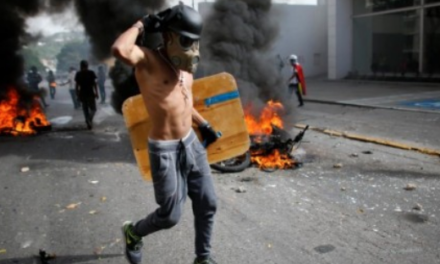Residents of Petare, one of the largest popular barrios in Latin America, protested for two days against the operations of the Special Actions Force of the Bolivarian National Police (FAES) in their neighborhoods. The protests came ten days after a FAES raid in the neighborhood left seven dead, including a computer technician with three children, returning home from work.
Protesters held signs saying they prefer the “safety” that local gangs offer, and asked to be converted into a “peace zone.” The latter is a figure used several years ago, in which the Nicolás Maduro government would make a truce with the gangs of a given area, agreeing not to crack down on them (see BBC coverage from 2015). Others demanded the presence of the National Guard instead of incursions by the FAES. This responds to a long term trend of people preferring the presence of National Guard over the police in their neighborhoods (see our coverage from 2014). Others said the FAES themselves appear to be malandros (thugs) as they use their raids to steal residents household items and food.
In her July report on Venezuela, United Nations High Commissioner for Human Rights Michele Bachelet specifically called on the Maduro government to disband the FAES. However, Maduro responded by reaffirming the government’s support for their actions, as Bachelet pointed out last month, at a meeting of the U.N. Human Rights Council in Geneva.
Humanitarian Emergency
- The U.S. Agency for International Development (USAID) and Inter-American Development Bank (IDB) announced a $13.5 million new partnership (BetterTogether challenge, JuntosEsMejor) destined to find and fund innovative solutions to help Venezuelans inside and outside the country.
- UNICEF has received only 54% of the funding it needs for 2019. The funding gap for Venezuela is one of the highest.
- A Pan American Health Organization report finds that while in the rest of the region the maternal mortality rate decreased, in Venezuela it increased for the period between 2000-2015 (no data is available for subsequent years).
- A New York Times investigation found dangerous levels of bacteria in the country’s running water.
Migration
- The European Union, together with the U.N. Refugee Agency and the International Organization for Migration, will host an international solidarity conference about the Venezuelan migrants and refugees in Brussels on October 28 and 29.
Human Rights
- The Maduro government has reacted as expected to its election to the U.N. Human Rights Council, claiming it shows that the “world didn’t believe Bachelet’s report” and “imperialism was defeated.” Members of the Lima Group criticized the vote. The European Union also expressed their disagreement.
Opposition
- The Venezuelan opposition is in search of a new strategy after months of unsuccessful efforts to oust Nicolas Maduro. President of the National Assembly, Juan Guaidó, called for a new wave of national mobilizations and protests. Guiadó also announced his plan for a national mobilization on the 16th of November.
Freedom of Expression
- An Oxford University study argues that the Venezuelan government is one the most active in social media manipulation.
Negotiations
- Efforts continue for a possible restart of negotiations between Juan Guaidó and Nicolás Maduro. The press says that negotiators close to Guaidó held meetings with international actors (U.S. and Spain) exploring the possibility of a new round of negotiations.
- The Venezuelan opposition asked the European Union to implement more sanctions against Maduro.
- Opposition leaders are grabbing what they can to up the ante for international stakeholders. Both Guaidó and Julio Borges have suggested Maduro is behind protests in Ecuador and Chile and reinforce the need for international pressure. But careful Latin America watchers have suggested that the upheaval in various countries has diverse, local causes.
- A roundtable with members of the Institute for Integrated Transitions’ “Group of Experts,” moderated by WOLA’s Geoff Ramsey discussed in detail the obstacles facing the negotiation process and possible ways forward. Pedro Nikken, Margarita López Maya, Orlando Ochoa and Michael Penfold weighed in. High quality video of the two hour event is below.



